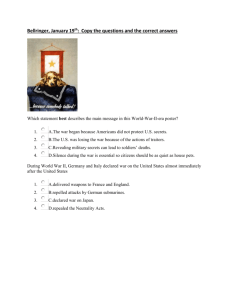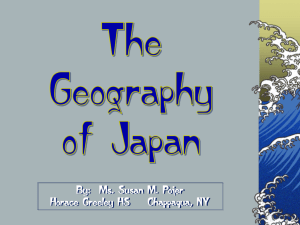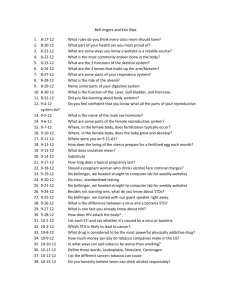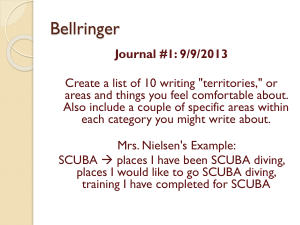Week of April 2f
advertisement
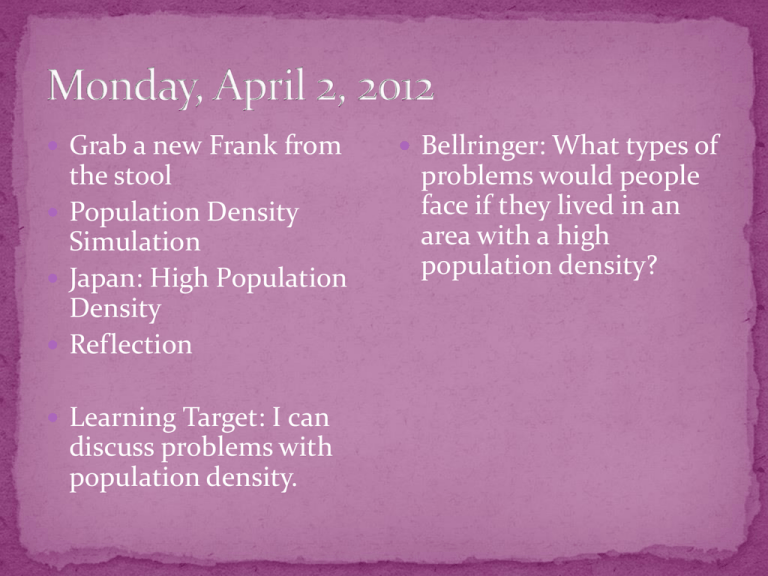
Grab a new Frank from Bellringer: What types of the stool Population Density Simulation Japan: High Population Density Reflection problems would people face if they lived in an area with a high population density? Learning Target: I can discuss problems with population density. Nippon -- “Land of the Rising Sun” Japan and the United States Japan’s Topography Plains Ishikari Plain Kanto Plain Nobi Plain Osaka Plain Cities Sapporo Kyoto Kobe Hiroshima Nagasaki Tokyo Yokohama Nagoya Osaka Fast Travel Throughout Japan Shinkansen: Bullet Train Japan’s Land Area and Utilization Mt. Aso -- Active Volcano Shiranesan Caldera Global Tectonic Plates Japan -- On the “Fire Rim of the Pacific” Japanese Earthquakes: 19611994 Kobe Earthquake -- January 17, 1995 Average Monthly Precipitation in Three Cities Japan’s Population Density 1,400 1,250 1,200 1,000 Thailand Japan China Hong Kong Singapore 800 600 400 200 61 126 7 0 Population in Millions 4 Japan’s Population Over 65 versus the United States Japan’s Growing Older Japan’s Age Breakdown Under 15 years 15.8% 15 – 59 years 63.3% 60 and over years 20.9% Hai: Yes Iie: No What are some of the problems that Japan faces because of its high population density? Go over Population Density Problems Solutions to population density problems Reflection Learning Target: I can discuss solutions to problems caused by population density. Bellringer: Grab your population density worksheet from the stool. Look at the picture below. Describe it using questions. Who, what, where, when, why, how. Conversation: Level 0 unless called on Help: Raise your hand Activity: Look at each picture and come up with questions. Fill out a Venn Diagram comparing the life in the United States to life in Japan. Movement: you may not get up to sharpen your pencil or go to the bathroom Participation: EYES on the screen. WRITE only about the topic Arigatoo gozaimasu: Thank You Doo itashimashite: You’re Welcome Your city is facing major problems due to overpopulation. Most of your people spend hours stuck in traffic, space (for farming and housing) is limited and pollution is rampant. You are a city planner. Design your own city which addresses these problems. Of the options we’ve talked about, which of these solutions to population density do you find the most appealing? Why? Look at your Venn Diagram. What similarities and differences do you notice to how the United States has dealt with it’s population density issues to how Japan has dealt with it’s issues? Middle East Test Debrief Culture in Asia Reflection Homework: Complete Bellringer: Match the term to the country where you think it originated. Haiku Cultural Aspect Learning Target: I can discuss how culture makes a country unique. Sari Pad Thai Vermicelli Kimono Curry Bee Bim Bo Hinduism Shintoism Mandarin Sumo Wrestling Country Japan India China Thailand South Korea Vietnam What is culture? What components can you think of ? How does it make a country or people unique? Conversation: Level 1 Help: Raise your hand Activity: Use a book from the back and create culture squares illustrating the differences in culture in Asian countries. You may share resources with a partner, but you must each create a culture square Movement: You may not get up to sharpen your pencil Participation: EYES on paper. WRITE only about the Asian country assigned. TALK only about the Asian country assigned to you. Think about the country that you researched. How does its culture make it unique? Culture in Asia Computer Lab No Learning Target Bellringer: Look at the picture below. Ask 6 questions (who, what, where, when, why) about the picture.

